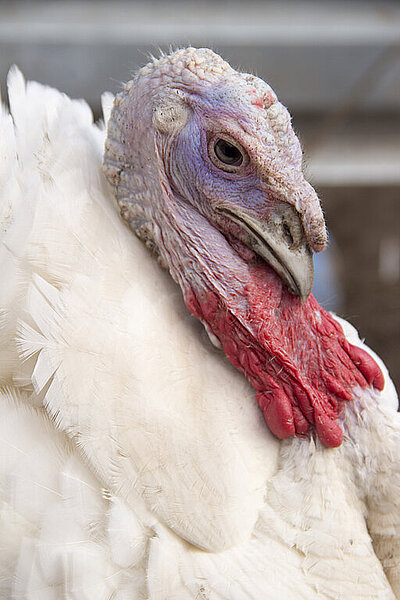Turkey protein

What is turkey protein?
Turkey protein is an animal protein made from turkey meat. It contains all the essential amino acids that your dog cannot produce itself and must ingest through food. Essential amino acids include isoleucine, leucine, lysine, methionine, phenylalanine, threonine and tryptophan. Turkey protein has a high biological value, which means that it can be easily converted by the dog's body into endogenous protein. The biological value of turkey protein is around 79, while that of beef is around 69.
What are the benefits of turkey protein for dogs?
Turkey protein has several benefits for dogs that make it a good choice for your four-legged friend's diet. Here are some of them:
- Turkey protein is lean and low in calories.Turkey meat has a low fat content and provides about 104 kilocalories per 100 grams. This makes it a good option for dogs that are prone to obesity or need to diet.
- Turkey protein is hypoallergenic. Some dogs are allergic to certain protein sources, such as beef or chicken. Turkey is one of the less allergenic meats and can therefore be an alternative for dogs with food allergies.
- Turkey protein is tasty and well tolerated. Most dogs like the taste of turkey meat and tolerate it well. It is easy to digest and does not put unnecessary strain on the gastrointestinal tract.
What are the disadvantages of turkey protein for dogs?
Turkey protein also has some disadvantages for dogs that you should be aware of before feeding it to your dog. Here are some of them:
- Turkey protein can contain too much phosphorus.Turkey meat has a high phosphorus content, providing about 198 milligrams of this mineral per 100 grams. While phosphorus is important for bone metabolism, too much of it can lead to an imbalance with calcium and increase the risk of kidney problems. You should therefore make sure that your dog gets enough calcium in its diet or add an appropriate supplement.
- Turkey protein can be contaminated with antibiotics or hormones. Conventional turkey farming often uses antibiotics or hormones to promote the growth of the animals or to prevent diseases. These substances can pass into the meat and affect your dog's health. You should therefore make sure that you only buy high-quality turkey meat from species-appropriate husbandry or organic products.
- Turkey protein can contain salmonella.Turkey meat can be contaminated with salmonella, which can cause a bacterial infection in your dog. You should therefore always cook the meat thoroughly or freeze it before feeding it to your dog. You should also ensure good hygiene and store and process the meat separately from other foods.
How do you feed turkey protein to your dog?
You can feed your dog turkey protein in various ways. Here are a few options:
- As dry food. There are many dry foods that have turkey protein as a main ingredient. You should make sure that the food has a high meat content and does not contain any artificial additives. You should also follow the manufacturer's feeding recommendations and adjust the amount of food to your dog's age, weight and activity level.
- As wet food. There are also many wet foods that have turkey protein as their main ingredient. You should also pay attention to the quality and composition of the food and adjust the amount of food to your dog. The advantage of wet food is that it contains more moisture and covers your dog's fluid requirements.
- As fresh meat. You can also feed your dog fresh turkey meat, either as part of a self-composed ration or as a supplement to a ready-made food. You should make sure that the meat is well cooked or frozen to avoid salmonella. You should also combine the meat with other ingredients, such as vegetables, fruit, rice or potatoes, to ensure a balanced diet.
Turkey protein is a high-quality protein source for dogs that has many benefits for the health and well-being of your four-legged friend. It is lean, low in calories, hypoallergenic, tasty and well tolerated. However, it also has some disadvantages, such as a high phosphorus content, possible exposure to antibiotics or hormones or a risk of salmonella. You should therefore pay attention to the quality and origin of the meat and prepare and store it correctly. You should also adjust the amount of food to your dog's individual requirements and supplement other nutrients if necessary. If you pay attention to these points, you can feed your dog turkey protein without hesitation and do him some good.
If you notice any signs of hypersensitivity or poisoning in your dog, you should see your vet immediately. We are not a substitute for a vet, but we try to be as accurate as possible. Every dog reacts differently and we recommend you get a second opinion or consult your vet if in doubt.
Stay healthy and take good care of your four-legged friend!😊